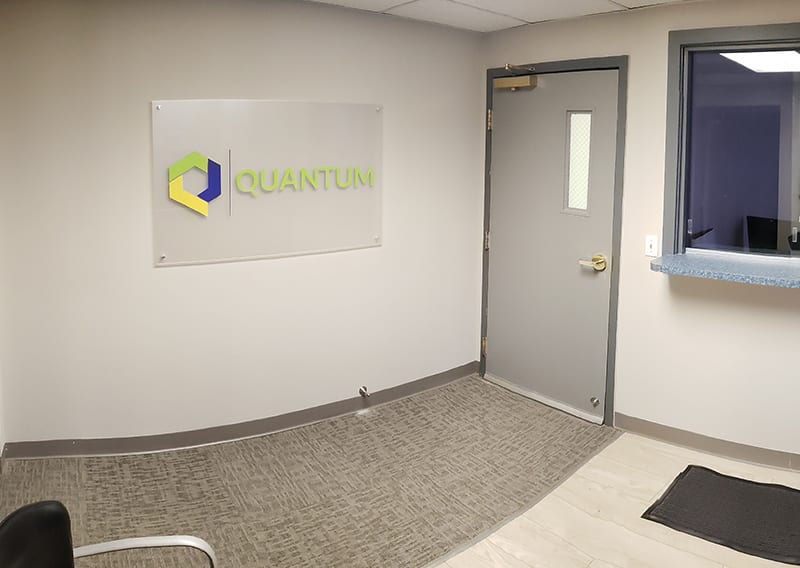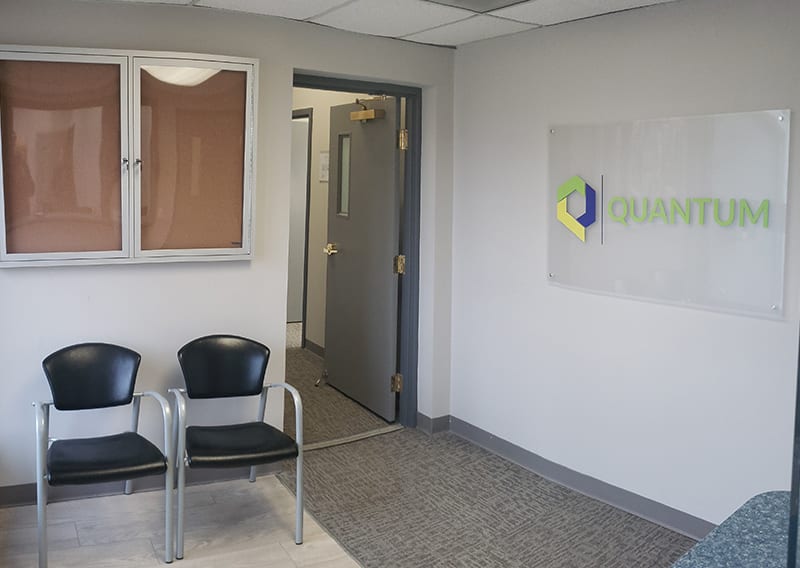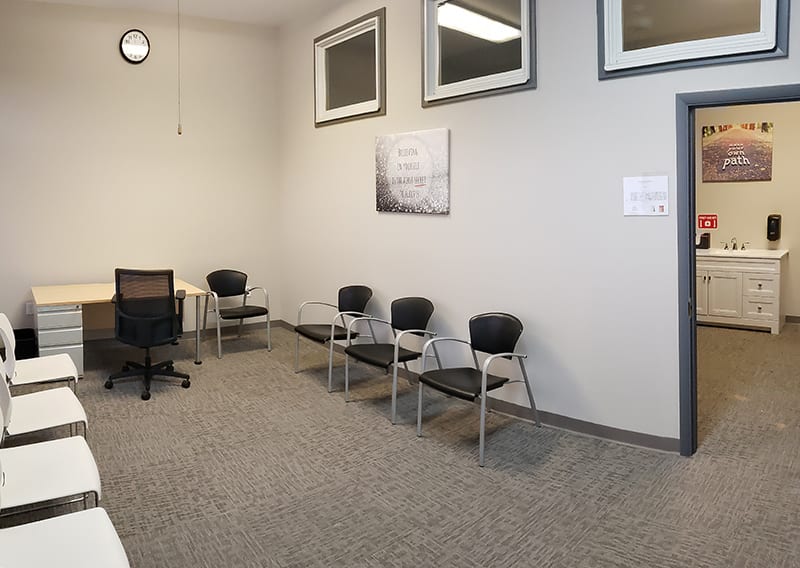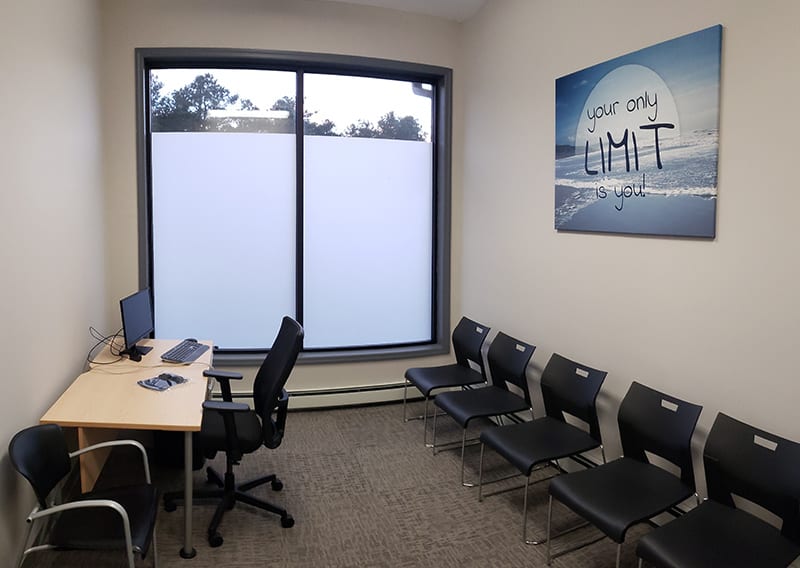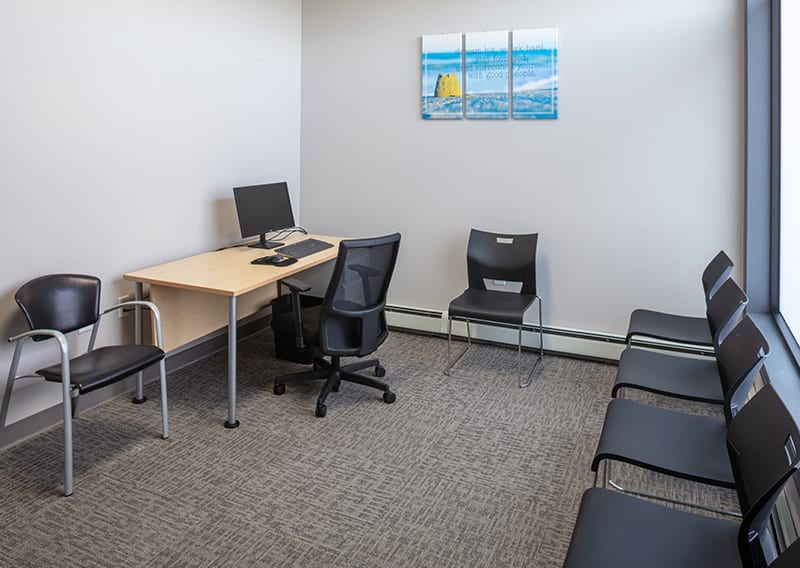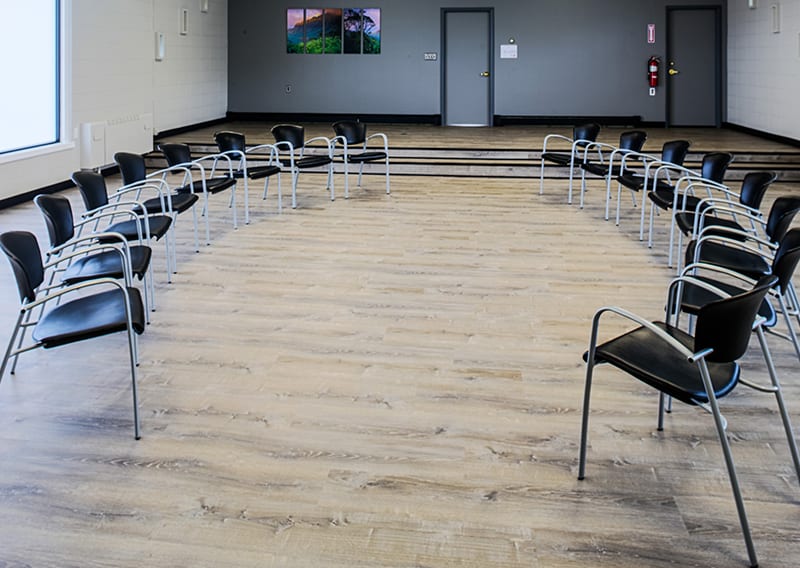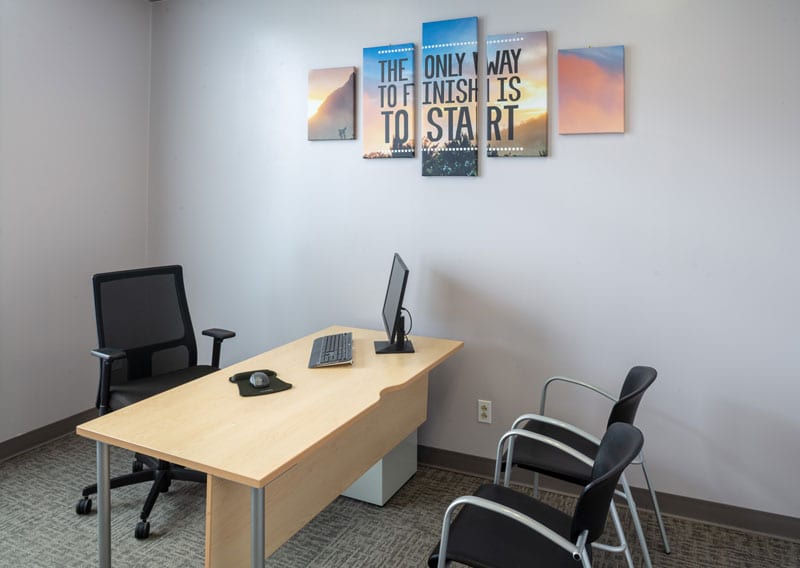Our facility is a warm, inviting, cozy, and secure environment that provides the perfect level of safety, comfort, and privacy as you receive treatment and get on your path to wellness. We’ve designed our space to allow for a low-stress environment where you can focus on your well-being.
Given the concerns of the COVID pandemic, we’re ensuring procedures are followed to create a clean environment for our patients, staff, and visitors. We’ve gone above and beyond CDC and New Jersey State guidance to design our cleaning and disinfecting protocol so that there is no question of the cleanliness and safety of our facility.
You’re here to get well and our priority is maintaining a safe, clean, peaceful, and welcoming environment for you to do just that.
To see our response to Covid-19, click here.
Photo Gallery
Click photos to enlarge
Are You Ready to Begin Your Journey to Recovery?
You could be completely covered. Verify Your Insurance Today.
The Quantum
Process Outpatient Rehab NJ
1. Make the Call
Contact our Quantum Team at
(609) 993 – 0733 to get started.
2. Complete
Your Intake
This streamlined process includes a series of questions and discussion of your unique needs and goals.
3. Get the Best Care Team Possible
After your intake, you’ll meet your Care Team, a group of amazing professionals dedicated to helping you make recovery reality.
4. On-Going Support
After you meet your Care Team, you’ll start to receive treatment based on a Care Plan that’s designed to help you achieve and sustain your recovery.
- Highest Rated Alcohol Detox Program
- Drug Detox Program
- Top Alcohol Rehab in Oklahoma
- Drug Rehab in Oklahoma
- How Much Does Rehab Cost in Oklahoma?
- How Long Is Detox?
- How Long Is Rehab?
- 30 Day (Short Term Rehab)
- Long Term Rehab
- Additional Therapies & Addiction Treatments Available
- Does My Insurance Have Coverage for Rehab?
- MAT
- Cognitive Behavioral Therapy
- Dialectical Behavioral Therapy
- Rational Emotive Behavioral Therapy
- Dual Diagnosis Treatment
- EMDR
- Relapse Prevention
- Life Skills Training
- Vocational Training
- Group Therapy
- Experiential Therapy
- One on One Therapy
- Family Therapy
- Trauma-Informed Therapy
- Physical Fitness
- Off-Site Activities
- Holistic Addiction Treatment in Oklahoma
- Anxiety Disorder
- Bipolar Disorder
- Borderline Personality Disorder
- Codependency
- Depression
- Impulse Control Disorder
- Post-Traumatic Stress Disorder
- Why Choose Quantum Behavioral Health?
Highest Rated Alcohol Detox Program
Quantum is the top rehab and addiction center for people living in Oklahoma because we believe that each patient is important, and we truly care about helping you. Our strong team of dedicated doctors, therapists, administrators, care providers, and clinical staff will work with you to help you create a treatment plan that is right for your unique situation, giving personalized attention and trauma-informed care at every level.
When you choose Quantum addiction treatment in Oklahoma City, you will receive an individualized treatment plan that will meet you where you are in your recovery journey, combining evidence-based therapies with holistic care, medical care, treatment for mental health disorders, and relapse prevention programs. Levels of care offered at Quantum are all outpatient treatments, meaning you will live outside of the facility as you attend our partial care program, our intensive outpatient program, or a customized outpatient rehab plan, designed to help each person achieve long-term sobriety. If you require a stay in inpatient detox or rehabilitation before coming to us, we can also refer you to trusted partners in our network.
At Quantum Behavioral Health we provide customized care that ensures your needs are being met on all levels. We do not simply see you as “an addict”. You are a person with depth, value, and worth, and we want to ensure that along with physical recuperation, you are also tending to your mental health and spiritual wellness. If you are no longer experiencing withdrawal symptoms, and do not need around-the-clock physical or mental health care, we will help you heal the underlying reasons for your addiction through comprehensive treatments that will address the emotional, physical, psychological, social, and behavioral aspects that cause addiction and provide you with alternate ways of thinking and acting, with stress-reduction techniques, coping mechanisms and healthy habits, and all the recovery skills you will need for long-lasting recovery.
Alcohol detox is a process that should be taken seriously. It is never recommended to try and stop drinking on your own, as withdrawal symptoms can be unpredictable, ranging from mild to severe, with the potential to cause serious health issues or even death if untreated. Common withdrawal symptoms from alcohol addiction include:
- Irritability
- Headache
- Nightmares
- Insomnia
- Tremors
- Anxiety
- Strong cravings for alcohol
In the case of serious addiction, alcohol detox can cause seizures and delirium tremens, with hallucinations, agitation, confusion, and brain chemical imbalances that can lead to death if untreated by doctors. A medically supervised detox within one of the safe treatment centers in our network of care facilities will ensure you stay safe as you stop drinking. Most medical detox centers will provide:
- 24-hour medical supervision and care as you detox by doctors and nurses
- Medications to keep you comfortable and help you avoid seizures, high blood pressure, and other issues
- Therapy or counseling available to help with the emotional and psychological aspects of detox, with dual diagnosis treatments for co-occurring disorders
At Quantum, our outpatient plans are designed to help you move forward after you have completed your detox. Detoxing before beginning alcohol rehab is the best way to ensure you are entering the next phase of your life with a clear head, ready to start over with new habits, without the distraction of withdrawal symptoms or cravings.
Drug Detox Program
When you go to a medical detox center for drug treatment, your treatment plan will be customized to suit your needs, as drug detox is different for each patient, and the different drugs and/or alcohol you were using. For example, a person with a fairly new addiction to crack cocaine will have different needs and a different timeline from a person who has been using heroin for years.
Medication-assisted treatment (MAT) plans are often implemented in the case of benzodiazepine detox and opioid detox, as quitting these drugs cold turkey can be dangerous to your health and can cause severe distress, pain, and/or cravings that may be impossible to ignore. A MAT treatment plan provides prescription doses of medications on a regimented schedule, helping you taper slowly off the drugs instead.
Drug detox programs at Quantum’s partner facilities often include an integrated combination of mental and physical health care, holistic treatments, nutrition, exercise, therapy, and other treatments to help each patient heal their body, mind, and spirit while preparing to enter rehab.
Top Alcohol Rehab in Oklahoma
At Quantum, we offer outpatient alcohol rehab services for residents of Oklahoma City OK. Treatment programs take place inside our recovery center, but you do not move in full time. Instead, you can continue to live at home, or move into a nearby sober living home and continue to live your life as normally as possible as you get the alcohol addiction treatment you need. You can go to work or school, take care of your family, pets and loved ones, and have the full support and care of our staff as you learn to integrate sober living into your everyday life.
Treatment is provided on a set schedule, depending on your program and your practical needs. The levels of care we provide at Quantum are:
- Partial Care (PC) – in the partial care program, you will come in for 20 or more hours of treatment per week. This is the outpatient plan most recommended to people who are in dual diagnosis for co-occurring mental health and substance abuse issues. Partial care plans address physical, psychological, emotional, social and behavioral health, and are offered during the day as that is when the majority of the staff are working. You will likely not have a full-time job while in partial care due to scheduling, as the focus should be on recovery and healing at this time.
- Intensive Outpatient Program (IOP) – the IOP is 9 or more hours a week of group therapy, individual therapy, behavioral therapy, and alcohol treatments designed to address any challenges you may be dealing with as you work to reintegrate into your everyday life as a sober individual. Treatments in the IOP are often provided before or after the workday, on weekends, or in the evening to accommodate for your life’s practical needs.
- Outpatient Care (OC) – outpatient care is a customized plan that offers fewer than 9 hours a week of treatments. This is designed to keep those who have completed their IOP connected to the structure and support of our treatment center, with continued connections to doctors, therapy, groups, 12-step programs, and our sober community as you live your life free from the grasp of substance use disorders.
Drug Rehab in Oklahoma
The outpatient rehab programs at Quantum have been created to help you begin the transition back to your normal life as you work through ongoing addiction issues through therapy, medical care, holistic care, and medication-assisted treatments. Some of the types of therapy and treatments you may receive at Quantum include:
- Group therapy, individual therapy, and counseling
- Evidence-based treatments like cognitive behavioral therapy
- Holistic treatments like yoga, art therapy, meditation and music therapy
- 12-step integration
- Vivitrol treatments to help with alcohol and opioid relapse prevention
You will learn coping techniques, stress management, emotional release, and new ways to prevent relapse, with behavioral health treatments at all levels of care. In our Partial Care program, we have mental health services with dual diagnosis treatments as well.
We offer after-work and weekend addiction treatments as you live at home or in a sober residence, so you will have the freedom to work a full-time or part-time job, see friends, and do what you wish in your free time. For many people, incorporating family into their program is beneficial, so if you wish we can provide family therapy, family support groups, and family information sessions, keeping them updated on your progress.
How Much Does Rehab Cost in Oklahoma?
One of the first things that crosses most people’s minds when they think about rehab is how they are going to pay for treatment. Because each patient’s plan is unique, the cost of your program will depend on several factors, like:
- How long you stay in outpatient rehab programs
- Whether you need to rent a room in a sober living home
- Which medications and therapies are included in your treatment program
- How much of your program your insurance will cover
At Quantum, we will help you create a plan that suits your budget, your insurance plan, and your needs, and we can provide you a quote if you plan on paying in cash. No matter what your situation is and what resources you have available, we can work with you to figure out a treatment plan that you can handle.
How Long Is Detox?
The amount of time you need to spend in substance abuse detox depends on factors like:
- What substance(s) you were using (drugs and alcohol)
- How much you were using at one time
- How long you have been using the substance(s)
- Your overall physical health
- Your overall mental health
- Genetics and metabolic variables
How Long Is Rehab?
As unsatisfactory as it may be to hear, each person’s addiction recovery has its own timeline, so it is not possible to give a timeline when it comes to rehab. If you go to inpatient rehab, for example, the average stay will be anywhere from 30 to 90 days, and outpatient programs can last for anywhere from a few weeks to years, depending on your comfort level, your budget/insurance coverage, your lifestyle, your goals, and your drive to overcome addiction.
30 Day (Short Term Rehab)
Most drug rehabs will consider 30 days in inpatient rehab a short-term stay. One month is the minimum amount of time it takes to reinforce new habits for most people, and it is a good amount of time for those who have completed detox but are not yet feeling ready to enter outpatient treatment due to a high risk of relapsing or because of ongoing health concerns. Staying inside a completely sober environment 24/7 with full support day and night in inpatient treatment centers can help patients stay away from drugs and alcohol as they begin their recovery journey, making psychological and behavioral changes that can last a lifetime. When followed by an outpatient program, 30 days of inpatient rehab can set the foundation for life-long change.
Long Term Rehab
Going to long-term rehab for inpatient treatment is an option many people with co-occurring mental health disorders may choose, as it will give more time for psychiatric medications to take effect and will allow a longer timeline for therapy and behavioral changes to become habit. Other people who benefit from long-term rehab include those still experiencing withdrawal symptoms, those who need full-time medical care and those with a high risk of relapsing. When followed by an outpatient substance abuse program at Quantum, a long-term rehab program will give the best possible chance of avoiding relapse and remaining in long-term recovery.
Additional Therapies & Addiction Treatments Available
At Quantum, we believe that a whole-patient approach to healing is much more effective than simply treating the physical drug and alcohol cravings. This is why we integrate holistic treatments and alternative options into each patient’s program alongside evidence-based treatment and therapy, including yoga, art therapy, meditation, music therapy, and integrating 12-step programs like Alcoholics Anonymous to add another layer of spirituality and community to your healing.
Does My Insurance Have Coverage for Rehab?
Because mental health issues and addiction are considered health care, your health insurance will most likely cover a large portion of your treatment. Each insurance company varies on what medications and therapies they will cover and from which treatment centers, so it is best to check on your individual policy. At Quantum, we will help you verify insurance coverage for addiction treatment and give you a quote for the remainder before you get started. It is important to note that we do not base your treatment plan around what your insurance tells you. Your progress, your comfort level, and your individual needs are what determines your next step, not the insurance company.
MAT
Medication-Assisted treatment (MAT) is a program used for alcohol and drug detox throughout a long-term substance abuse treatment plan for people who need additional help quitting substances like alcohol, benzodiazepines, and opioid drugs, as the withdrawal symptoms can be severe if the body is suddenly cut off completely from these substances, with pain, distress, and dangerous seizures.
Prescription doses of FDA-approved medications are given on a predetermined schedule as a part of an integrated treatment program that involves therapy, groups, counseling, 12-step programs, meditation, yoga, etc., helping you slowly taper off the addictive substances at a measured and safe rate. The medications provided will not create a new addiction, nor will they get you high. They are given to keep withdrawal symptoms and drug cravings at bay as your body becomes used to the new normal. When combined with an outpatient rehab program with relapse prevention and long-term aftercare, MAT programs are a useful addition to alcohol and drug recovery.
Cognitive Behavioral Therapy
Cognitive behavioral therapy (CBT) is a mental health treatment that focuses on the effect thoughts and behaviors have on the way we feel. The idea is that changing the way we behave and the way we think can have a positive overall effect on your outlook, while reinforcing healthy behaviors, understanding the “why” behind addiction, providing coping tools for stress and cravings, and helping you live a happier sober life long-term.
Dialectical Behavioral Therapy
Dialectical behavioral therapy is a type of cognitive behavioral therapy that teaches distress tolerance through mindfulness and emotional regulation. This helps patients inside and outside rehab centers to understand the emotional and the social reasons behind their addiction, and to react to negative stimuli in new positive ways, replacing unhealthy habits and behaviors with healthy ones.
Rational Emotive Behavioral Therapy
Rational emotive behavioral therapy (REBT) is a common type of behavioral addictions therapy used for treatment of drug abuse because it addresses the rational mind, helping patients bypass emotional shortcuts and really think about their reactions to negative stimuli. REBT helps patients challenge their own thoughts and responses with the idea that perception determines the way we think and feel about the world as a whole. This modality also provides healthier stress management techniques.
Dual Diagnosis Treatment
Dual diagnosis treatment in drug and alcohol rehab is the treatment of mental health and substance abuse issues together in one combined program. Often, mental illness, trauma, and other mental health problems are deeply connected with a person’s addiction, or they come from the same underlying root issues in the mind and the body. They may also occur together because:
- Drugs and alcohol can trigger underlying mental health issues that were under control
- Substances can interfere with prescription medications for mental health
- Some people have a chemical imbalance in their brain that causes impulsive behaviors
- Some people have genetic predispositions that lead to addiction and mental illness
- Many people with mental health issues will turn to drugs and alcohol to mask their symptoms or to feel normal
With medical doctors, therapists and other care providers working together for a whole-patient approach to healing, both issues will be treated at the same time through an integrated treatment plan.
Some of the most common mental illnesses seen alongside addiction are:
- Depression
- Generalized anxiety disorder
- Social anxiety disorder
- Panic disorder
- Bipolar disorder
- Post-traumatic stress disorder (PTSD)
- Attention deficit disorder (ADD)
- Attention deficit hyperactivity disorder (ADHD)
- Borderline personality disorder (BPD)
- Eating disorders
- Schizophrenia
- Suicidal tendencies
EMDR
Eye movement desensitization and reprocessing is a type of therapy used to help patients process trauma that the brain is “stuck” on. By engaging the parts of the brain involved in memory, while at the same time having the patient do eye movements or listen to tapping sounds or audio tones, a trained therapist can create a state of dual awareness, in which the patient can re-process the memory in a way that is much less emotionally disturbing.
Relapse Prevention
One of the main issues many people have when leaving detox programs and inpatient rehab is losing their support system and not knowing where to turn when life’s triggers and temptations hit. That is why our outpatient treatments are so beneficial. Recovery is not an easy road to walk, and there are bound to be bumps and potholes along the way. When you come to Quantum for drug or alcohol treatment, you will not only have our full support for as long as you need, but you will also learn the relapse prevention skills that will last you a lifetime, with connections to care, support, and peer groups you can reach out to any time, day or night, when times become difficult.
Life Skills Training
Drug and alcohol treatment is not all about your addiction. You will also have the option to learn life skills that you may have missed out on due to substances taking over your life. Many people who have had drug and alcohol issues in their family and throughout their youth, teen, and young adult years may not have learned skills others may think are basic, which causes self-esteem issues and makes it more difficult to live independently. Some life skills you may learn in rehab include creating and balancing a budget, social skills, taking care of your body through hygiene, exercise and nutrition, cleaning, or cooking. Learning these basics will allow you to feel confident in living on your own after rehab and will help you contribute to your household as you take care of yourself.
Vocational Training
Financial independence can open up the world to you, and having a job is a big part of normal life for most American adults. When addiction takes over your life, you may miss out on the skills and socialization needed to gain employment and hold on to a job. Drug and alcohol rehab centers that offer vocational training may teach you the skills like interviewing, job searching, resume building, time management, or financial skills that will get your foot in the door and allow you to make yourself and your future a priority.
Group Therapy
In group therapy, several patients will gather together with one or more therapists who will guide a discussion or provide education centering around a main topic or theme. Group therapy is helpful to many individuals because it provides a supportive environment in which communication skills can be practiced and issues can be discussed. Patients also feel less alone as they learn that others have the same problems and thoughts they do, and they may also gain a new perspective on their own issues. Group members can empathize with one another, offer suggestions, tell stories and help one another learn they are not alone. In a drug rehab center, group therapy is often about topics like relapse, addiction, mental illness, stress management, and other common issues surrounding substance use disorders.
Experiential Therapy
Experiential therapy involves an experience like creating art or listening to music as patients and therapists talk about past trauma and difficult emotions. This type of therapy reframes the way emotions are experienced through positive or neutral actions being performed while talking about thoughts and issues.
One on One Therapy
One-on-one therapy is commonly used in most Oklahoma drug or alcohol rehab programs. This is the type of therapy often depicted in the media with a patient and a therapist alone in an office discussing problems the patient is having. During this individual therapy time, you may discuss anything that is on your mind, standing in your way, or causing you to feel overwhelmed or unhappy. The therapist may listen, offer suggestions, or work with you to help come up with solutions. Within an addiction program, the therapist may also help you discover the roots of addiction and provide coping skills and stress reduction tools that will improve your overall quality of life.
Family Therapy
In family therapy, like group therapy, two or more people will get together with a therapist to discuss issues. It may be the whole family or just a few loved ones who want to work on strengthening their communication and their relationship. This type of therapy is usually short-term, helping family members work through guilt, pain, blame, and other difficulties as they learn to avoid problematic behaviors. In the case of addiction, family therapy can be used to:
- Mend broken relationships to rebuild your support network
- Teach family members about addiction so they can better understand what is going on
- Teach family members how to best help their loved ones while avoiding codependency and enabling behaviors
Trauma-Informed Therapy
Trauma-informed therapy is administered by therapists who understand that each person who comes to the rehab centers in Oklahoma has likely had difficult and traumatic experiences in their lives. Many people who have drug and/or alcohol addiction have experienced scary medical issues, have had troubles with the law or authority figures, have had difficulty with health care providers, have been in violent or dangerous situations, or have witnessed overdoses or other incidents. Taking a trauma-informed approach to treatment involves acknowledging this fact, and then working to ensure each patient feels safe and is not re-traumatized by being in rehab. This may include:
- Answering all your questions thoroughly, with full transparency into your treatment and anything that has to do with you or your health
- Never making you feel stupid for asking a question
- Not pressuring you into doing anything you do not understand or that you do not want to do
- Making sure you are part of the decisions regarding your own health
- Asking for consent before touching you or administering any medication or treatment
Physical Fitness
Moving your body, exercising, and stretching are the perfect recovery activities, because they not only promote strength and wellness, but they also help your mental health and your spiritual wellness. A workout routine will build stability into your life, and joining a sports team, fitness club, yoga class or other group activity will help you meet others who care about their health and wellness, possibly helping you grow your social community.
Off-Site Activities
Inpatient rehab is hard work, and when you live in a rehab facility full-time for weeks or months in a row, you may begin to feel like you need a change of scenery. Off-site activities are often arranged by the rehab facility to bring patients out into the world to events, nature locations, or to fun sober activities to break up the monotony and to help you learn new ways to have fun as a sober person.
Holistic Addiction Treatment in Oklahoma
Addiction affects the mind, body, and the spirit, so holistic treatment options are often offered alongside traditional therapy to incorporate all aspects of healing into a treatment plan. At Quantum, we have acupuncture, sound therapy, yoga, and reiki treatments that can provide better overall wellness, stimulating spiritual growth and strengthening the mind-body connection.
Anxiety Disorder
When a person has an anxiety disorder it goes well beyond normal worry. A person with an anxiety disorder will often experience excessive fear and anticipate the worst possible outcome, with intrusive thoughts and distress. Other symptoms are shaking, nausea, insomnia, dizziness, rapid heart rate, irritability, and panic attacks.
Bipolar Disorder
Bipolar disorder used to be called “manic depressive” disorder because a person with this issue will experience two distinct types of episodes. Mania will make them feel euphoric, with high energy, agitation, jumpiness, and a feeling that they can take on the world, and depression will cause low moods, sadness, lethargy, hopelessness, forgetfulness, sleep issues and suicidal ideation.
Borderline Personality Disorder
Borderline personality disorder affects the way a person feels about themselves and others and causes difficulty connecting to other people. Symptoms include unstable relationships, impulsive and self-destructive behavior, self-harm, mood swings and a fear of abandonment.
Codependency
A codependent relationship is what it is called when two people who have dysfunctional traits get together. When it comes to drug addiction, one person in a codependent relationship will enable the other’s drug use and irresponsible behaviors, taking care of them without setting healthy boundaries. This may look like giving money, bailing them out of difficult situations, etc. There may also be control issues, and low self-esteem, with painful emotions, denial, and stress.
Depression
A person with clinical depression will experience profound emotional lows with prolonged feelings of hopelessness that go far beyond regular feelings of sadness. They may also lose interest in hobbies and activities, have low energy and difficulty concentrating, have angry outbursts, gain or lose weight due to changes in appetite and sleep patterns, and have feelings of helplessness, with some people experiencing suicidal thoughts.
Impulse Control Disorder
When a person cannot resist allowing impulsive actions to take over, they may have an impulse control disorder. This presents in many different ways, like kleptomania (stealing uncontrollably), oppositional defiant disorder (challenging authority figures), intermittent explosive disorder (having uncontrollable angry outbursts) and pyromania (uncontrollable urges to set fires). People with impulse control issues become agitated easily, and often have low self-esteem causing them to be socially withdrawn.
Post-Traumatic Stress Disorder
When a person experiences an event that is shocking, dangerous, scary, or life-threatening, they may begin to experience symptoms like avoidance of certain situations or places, reactivity and jumpiness, negative thoughts and mood, and intrusive thoughts or flashbacks to the event with feelings of fear and stress from the body’s fight or flight response, even when they are not in actual danger at the moment. These symptoms usually begin three or more months after the initial trauma.
Why Choose Quantum Behavioral Health?
Residents of Oklahoma City, Oklahoma who are suffering from a substance use disorder can rely on Quantum to provide a safe place to rehabilitate in outpatient programs that are tailored to your needs. We will provide you with a level of care that matches your needs, so whether you have an addiction to sleeping pills, alcohol, or cocaine, you will get the help you need as you live your life as normally as possible, with full support, medical care, and long-term strategies that will help you remain on your road to recovery. We have a streamlined process in which we ask a series of questions about your goals and your needs, followed by a meeting with our care team, and then treatment. Please call us today to find out more about our process and how to get started.

